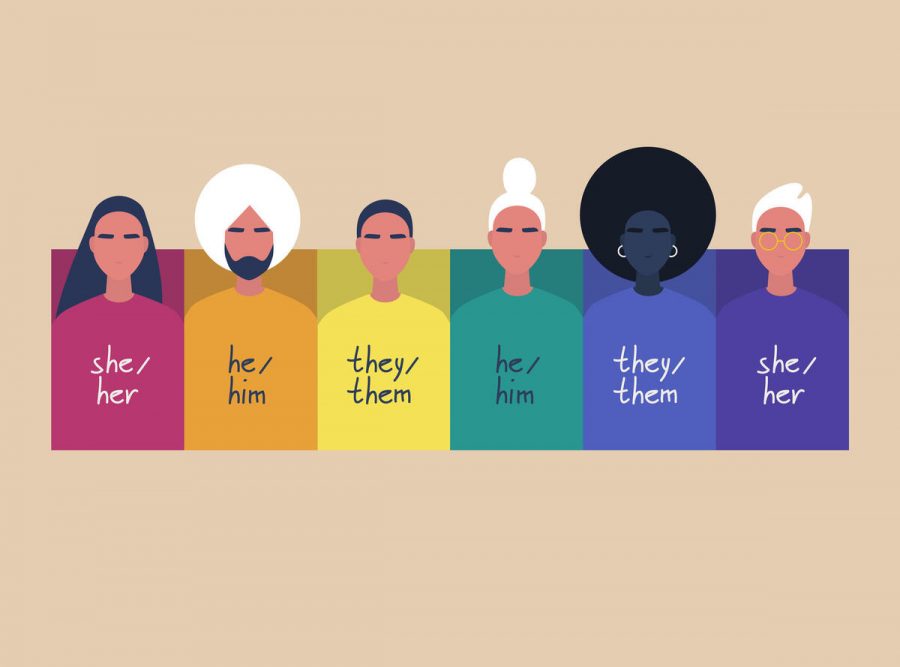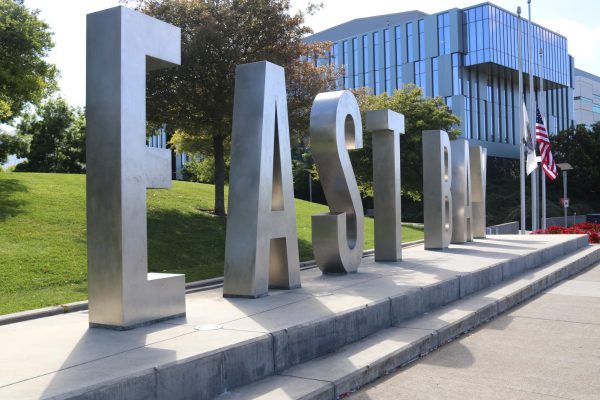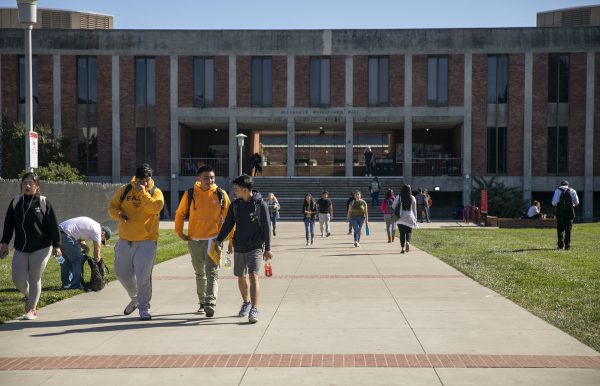‘Harmful’ Binary Language Apparent in CSUEB Continuing Education Courses
September 8, 2021
Despite CSU East Bay’s reported commitment to inclusion, some students feel that the CSUEB’s Continuing Education Certificate Program is not inclusive.
A Continuing Education “transgender & non-binary student,” who wished to remain anonymous, wrote to The Pioneer about “an incredible amount of perpetuation of binary language within the HR certificate program.”
The course included binary language throughout the Blackboard pages and slide shows including, “VISIBILITY: How aware others are of a leader’s power and position. Leader power increases when others know about the leader and the resources he or she can provide,” according to evidence obtained by The Pioneer.
Students’ recent complaints regarding the use of gendered language in the classroom raise questions about East Bay’s commitment to diversity. From 2014 to 2019, the campus was acknowledged annually with the Higher Education Excellence in Diversity (HEED) Award by Insight Into Diversity Magazine. The HEED award “recognizes colleges and universities that demonstrate an outstanding commitment to diversity and inclusion.”
The HEED award is one of many Diversity and Inclusion awards granted to CSUEB in recent years including, Wall Street Journal’s 2020 “Environment” / Diversity (Ranked No. 5 out of 600) and U.S. News & World Report’s 2020 Greatest Racial and Ethnic Diversity (Ranked No. 7).
“It’s important for students to see themselves reflected in their professors and staff. We are committed to the breadth of diversity represented at Cal State East Bay and will continue to develop programs and services to support student success and the success of our faculty and staff,” explained former CSUEB diversity officer Dr. Dianne Rush Woods in a 2018 interview.
Campus doesn’t emphasize gender
It is imperative to construct an inclusive environment on campus, so students feel respected and can perform to their highest potential, according to professor of communication at CSUEB Dr. Jennifer Zenvoich.
“On our campus, we want our students to feel connected and [create] a community. And we want them to learn; when you’re not supported or affirmed as a human being [by using one’s gender pronouns], it makes it harder to learn,” said Zenovich.
A recent Trevor Project survey found one in four LGBTQ+ youth (aged 13 to 24) identify as nonbinary. CSUEB reported they comprise .1% of the student body, according to the school’s Spring 2021 “Quick Enrollment Facts” sheet. The campus provides additional information about diversity, including a non-binary “sex” option alongside female and male. This option should say ‘gender’ rather than ‘sex’ as the latter is an individual’s biological characteristics and gender involves traits, expressions, and roles in society according to The Medical News Today.
We contacted faculty and staff on campus regarding the student’s report about the use of binary language but have not received a comment.
In a series of emails in early April 2021, the source brought the use of binary language in the classroom to the attention of Continuing Education program director Kate White and other administrations.
“Thank you for your email and your willingness to share your concerns with us. I am sorry to hear that you’ve been made to feel excluded by the language and material used in the Labor Relations course,” White wrote on April 8.
White responded to a request to discuss the emails received from the source by directing The Pioneer staff to Kimberley Baker-Flowers, CSUEB’s University Diversity Officer. Baker-Flowers redirected The Pioneer staff to CSUEB’s Academic Provost Linda Dobb on August 4.
“We did training with all department chairs in February [in a presentation that] encouraged them to speak with their faculty about using inclusive language and respecting student preferences in classes,” Dobb explained.
Dobb mentioned that it has yet to be put into policy that faculty must include inclusive, non-binary language within syllabi. There has been no conversation regarding binary language in CSUEB’s Continuing Education department.
White gave email confirmation that something would be done to address the source’s complaint on April 8, “We will speak to our instructors immediately about updating their content to provide an inclusive and welcoming learning experience for all.” Yet, the program seemed to have taken no action, as our source said that binary language was present in their subsequent courses.
Discussion about eliminating binary language raises questions about academic freedom, an existing principle that ensures instructors are protected from retribution if their scholarly findings are controversial.
“Scholars can have all sorts of ideas about sex and gender, even ones that we may find objectionable, as a part of their research [relating to academic freedom],” Dr. Jennifer Eagan stated CSUEB professor in the Department of Philosophy & Religious Studies and Chair of the East Bay’s CFA Faculty Rights Committee.
“There are laws and policies that limit or condition if how those ideas are brought into the classroom, which is where those ideas may impact students and cause harm, like making women, gender non-conforming, and students of color feel inferior or unwelcome in the classroom,” Eagan continued.
The California Faculty Association, which represents all California State University (CSU) faculty members, protects academic freedom.
“Our chapter leadership strongly encourages East Bay faculty to learn about, and use, non-binary language in their course syllabi,” CFA East Bay campus representative Rachael Stryker said.
CSU “Does not currently have an official stance on the use of binary language to define/describe gender and gender identity,” Stryker said.
While East Bay prides itself on diversity for all (regardless of race, sex, and gender) to learn, students still feel unaffirmed in their identities. Evidence provided by the source raised the question: is the HEED award simply a facade of diversity?
Despite its commitment to inclusivity, some CSUEB professors continue to use binary language throughout their course materials.

















